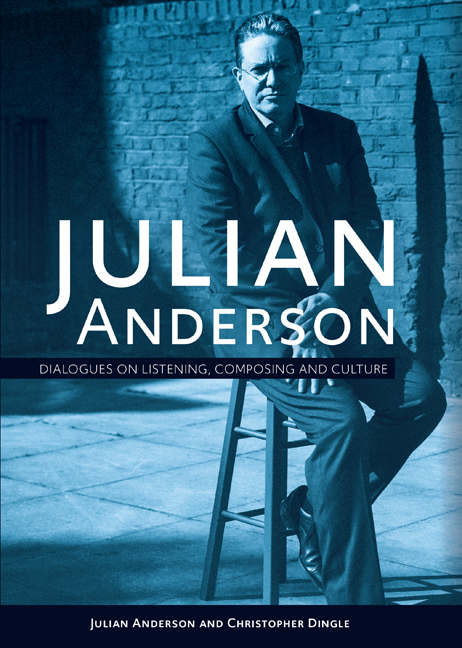Book contents
- Frontmatter
- Contents
- List of Illustrations
- Foreword
- Acknowledgements
- Introduction
- Prelude – Jeux: A Conversation Over Lunch
- Conversation One Origins
- Conversation Two Enthusiasms
- Conversation Three Training
- Conversation Four Dance
- Conversation Five Folk
- Conversation Six Composing (or Not)
- Conversation Seven Understandings
- Conversation Eight Beginnings (and Endings)
- Conversation Nine Puzzles
- Conversation Ten Singing
- Conversation Eleven Olly
- Conversation Twelve Memory
- Conversation Thirteen Opera
- Conversation Fourteen Practices
- Conversation Fifteen Outsiders?
- Conversation Sixteen Quartets
- Conversation Seventeen Advocacy
- Conversation Eighteen Partnerships
- Coda: Multiple Choices
- Chronology
- List of Personae
- Glossary of Musical Terms
- Macrotonality
- Catalogue of Published Works by Julian Anderson
- List of Recordings of Julian Anderson’s Music
- Bibliography
- Discography
- Index
Conversation Eight - Beginnings (and Endings)
Published online by Cambridge University Press: 16 September 2020
- Frontmatter
- Contents
- List of Illustrations
- Foreword
- Acknowledgements
- Introduction
- Prelude – Jeux: A Conversation Over Lunch
- Conversation One Origins
- Conversation Two Enthusiasms
- Conversation Three Training
- Conversation Four Dance
- Conversation Five Folk
- Conversation Six Composing (or Not)
- Conversation Seven Understandings
- Conversation Eight Beginnings (and Endings)
- Conversation Nine Puzzles
- Conversation Ten Singing
- Conversation Eleven Olly
- Conversation Twelve Memory
- Conversation Thirteen Opera
- Conversation Fourteen Practices
- Conversation Fifteen Outsiders?
- Conversation Sixteen Quartets
- Conversation Seventeen Advocacy
- Conversation Eighteen Partnerships
- Coda: Multiple Choices
- Chronology
- List of Personae
- Glossary of Musical Terms
- Macrotonality
- Catalogue of Published Works by Julian Anderson
- List of Recordings of Julian Anderson’s Music
- Bibliography
- Discography
- Index
Summary
This conversation explores Anderson's orchestral music from the tragic impetus for The Crazed Moon to Eden. The harmonic nature of The Crazed Moon and the avoidance of the pitch C in Stations of the Sun are noted before discussing the brief gap in composing before Alhambra Fantasy and the way that work's examination of form led to it occupying a pivotal place in Anderson's output. The importance of Pierre Schaeffer's Solfège de l’objet Sonore to the musical approach in The Bird Sings with its Fingers is explained, while a picture of a Finnish lake and Sibelius are revealed to be key factors in Symphony. The use of what Anderson calls ‘macrotones’ is explored, leading to a more general dialogue about non-tempered tunings in performances of Schubert, Haydn and Handel, before returning to their use in Anderson's Eden and the influence of Brâncuși's sculptures on that work. The conversation concludes, appropriately, with a reflection on how pieces end.
CD: You said in another conversation that you started to compose because you love the sound of the orchestra, so I wonder if we can look at some of your orchestral music, starting with The Crazed Moon.
JA: That was the only slow piece I wrote at the time. Except for the second part of Diptych, most of my music between ‘88 and ‘98 was very fast. It was because of that list of adjectives I assembled describing my previous music. My teacher, John Lambert, said, ‘I do get bored of seeing music always at crotchet equals 40.’ Then, when I started writing the opposite, he said, ‘Hey, what happened?’ [Laughter]
CD: So what prompted the return to slow music?
JA: A friend of mine had died, a young composer called Graeme Smith, who was a lovely guy. He just dropped dead of a brain haemorrhage one evening on a railway platform. He was working as a freelance for a few years, and had decided to go back to study composition at postgraduate level. He was about to come study at the Royal College – not with me, but we knew each other well. He worked in Tower Records in Piccadilly. I remember, he found me the Reinbert de Leeuw recording of [Messiaen’s] La Transfiguration, which had just come out. I went to collect it and thank him, and that was the last conversation we ever had.
- Type
- Chapter
- Information
- Julian AndersonDialogues on Listening, Composing and Culture, pp. 153 - 173Publisher: Boydell & BrewerPrint publication year: 2020

